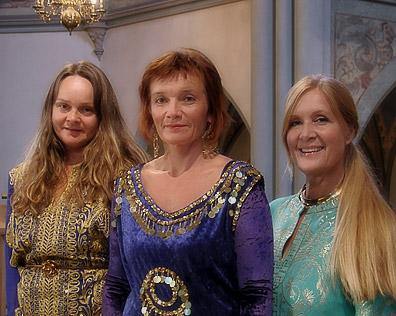
QIYANS KRETS
The ensemble Oiyans krets was founded in 2005 by flautist Josefine Liftig, harpist Sally Sehlin and singer/choreographer Mireille Leblanc. Each contributing and sharing musical material which they interpreted in their own way, the ensemble started out on the cultural treasure hunt that it now pursues. Josefine has for years been researching the material’s historical and musical background. The instrumental arrangements on this CD were created jointly by Josefine and Sally. Together with present singer Marianne Holmboe, trained in Arabic and Flamenco singing, they have also created the ensemble’s vocal arrangements. Present harpist Veronika Halten adds her own, new flavour to the music.
Their music takes up the threads of the Sephardic, Arabic and Occidental traditions, through time and space to the present day. They follow in the footsteps of the Qiyan (see notes for CD 2), weaving a rich fabric of sounds and tonal pictures from their European tradition, adding pearls from near and far and yarn coloured by more than a thousand years of history.
When Qiyans krets in 2007 contacted Lars Hernqvist, having learned that he was also pursuing Sephardic music, a fruitful collaboration started. It has resulted in a number of concerts with Oscar Fredriks Kammarkör and Qiyans krets, as well as this CD!

ECHOES OF QIYAN
Oscar Fredriks Kammarkör (The Oscar Fredrik Chamber Choir) is one of a number of ensembles based in the parish of Oscar Fredrik’s church in Gothenburg, which houses orchestras and choirs on different levels and for different ages. The choir has existed for over 20 years, and has over time given many highly praised concerts and been involved in different choir projects. The choir has toured abroad as well as in Sweden, visiting Italy, Ireland, Germany, Denmark, Poland, Hungary, and has been engaged in choir festivals all over Sweden. It has performed on the radio and collaborated with the Gothenburg Opera.
From the very start, the choir has been directed by Lars Hernqvist, organist and choir leader at the Oscar Fredrik church.
In addition to their repertory of major sacred classical works for choir and orchestra, Oscar Fredriks Kammarkör has also ventured into the Jewish music tradition as is heard on this CD. It is, in general, music never before arranged for choir. The choir has carried out a similar project with Jewish music before, collaborating with klezmer musicians and recording a CD with songs in Jiddish. Here, in collaboration with Qiyans krets, the choir focuses on Sephardic music, with its origins in Al-Andalus.
Sephardic music
When the Sephardic Jews were driven out of their ”Sepharad”, Spain, in 1492, they had been living there since pre-Christian times. Many of them settled in the Ottoman Empire, and others settled in f. ex. North Africa, America and Western Europe.
During the Umayyad dynasty in Al-Andalus, or Moslem Spain, the Jews had experienced a Golden Age during which their poetic and musical cultural expression had been enriched and refined through the amazing mixture of influences they were surrounded by in that era.
The Sephardic Jews took their music with them into exile, including a wealth of secular songs in their own language, Ladino, a form of early Spanish. These were passed on from woman to woman, despite the disapproval of their male religious leaders.
We have these women’s flouting of authority to thank for the unbroken Sephardic song tradition that we celebrate today! We do it in our way, just as our predecessors did – countless new elements have crept in over the centuries, both in texts and melodies. And this is how we perform them...
Medieval music, A span of songs, from Al-Andalus all the way up to our Nordic homeland
About Qiyan
Qiyan were well educated slave-women of varying ethnic backgrounds who entertained at the Moslem courts in former times. These women were highly prized poets, singers, instrumentalists and dancers, and they were responsible for performing and spreading the works of the composers of the period.
As the Christian warlords conquered more and more of the Moslem territories in Spain, i.e. Al-Andalus/Sepharad, qiyan were taken back to the courts of Europe as booty.
”The first troubadour”, William of Aquitaine (969–1030), grew up among qiyan that his father had brought home from his campaigns, and was surely influenced by them. The troubadour movement, which started in Provence, contributed to spreading their influence to the rest of Europe, as these travelling musicians moved from court to court.
Much more could be said about qiyan, but suffice it to say that these our predecessors have forged and handed down a strong tradition of improvisation and renewal. One can think that we sail in their wake, sending on new ripples to the future.
The Vikings also sailed, all the way down to ”Jakobsland”, the Iberian peninsula, where they were called ”lordemani” or ”al-mayus”, i.e. fire worshippers. They first attacked Sevilla in 844 – some of them stayed on and are said to have made the best cheese in the region! The emir Abd al-Rahman II later sent an emissary from Córdoba to Scandinavia to establish diplomatic relations. Medieval Arab coins are still found in our Nordic soil, and there might have been one or two musical seeds from Al-Andalus planted there, too… In any case, the troubadour ballad influence also spread all the way up to the North, so the cultural links to Al-Andalus do exist here as well.
Qiyans krets consists of Marianne Holmboe, vocals & percussion,
Veronika Halten, harp & vocals, Josefine Liftig, ethnic flutes, vocals & percussion
Oscar Fredriks kammarkör, conducted by Lars Hernqvist
Also featuring Anders Waernelius, percussion, Michael Andersson, percussion, & Sally Sehlin, harp
|